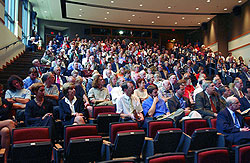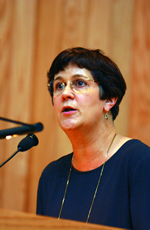

 |
||||
|
Friday, October 4 was ominously gray in Oberlin, and skies darkened throughout the afternoon. But neither leaden skies nor heavy rain could dampen the spirits of Obies gathered to celebrate the dedication of the new Science Center. "We are thrilled to be dedicating a science center that is truly second to none!" declared Vice President of Academic Affairs and Dean of the College of Arts and Sciences Clayton Koppes, welcoming the 300-plus alumni, donors, students, trustees, faculty, and staff members seated in the West Lecture Hall. In an apt demonstration of the center's technological capabilities, an overflow crowd viewed the proceedings via a video hookup in an adjacent classroom. Architect Robert Schaeffner, Jr., principal of Payette Associates, the firm that designed the center, noted how the structure has altered the campus. "It's hard to remember what was here before: a 300-foot-long blue building. Looking at it now, no one would believe that." Thomas J. Klutznick '61, chair of the Oberlin Board of Trustees, spoke movingly from his background as a real-estate developer, putting the Science Center into both educational and societal contexts. "Rarely have I seen a building that embodies the spirit and mission of the people it serves as well as this one does," he said. "This building illustrates the Oberlin ethos. When these young scientists go out into the world, they are going to be fierce advocates of upsetting the status quo. They are going to work--and work hard--to find ways to prevent disease in the world's most vulnerable populations, to create hybrid crops that resist drought and infestation, to discover cures for mankind's most deadly diseases. ...They'll be people who use their knowledge to change the world." Dedication events continued Saturday morning with three topical lectures by prominent scientists, including Donald A. Henderson '50, founding director of the Hopkins Center for Civilian Biodefense Strategies at Johns Hopkins University; Paul O. Wennberg '85, professor of atmospheric chemistry and environmental engineering at the California Institute of Technology; and Kenneth R. Miller, professor of biology at Brown University. Jeanne L. Narum, director of Project Kaleidoscope, an informal alliance of individuals and institutions working to strengthen undergraduate programs in science, mathematics, and engineering, closed the dedication events with a short address. "If I had a magic wand, or if someone gave me one wish," Narum said, "I'd wish that every college in America could offer students the education you have here in this building."
Because we believe that science is essential to a liberal arts education, we wanted a center that would break down the divide between the sciences and the humanities, welcoming everyone and serving as a campus crossroads. Because the traditional fields of science are rapidly melding into interdisciplinary endeavors, we wanted a center that would accommodate and encourage such work. Because we have long known that students learn science by doing science, and that serious scientific interest is nurtured by opportunities for students to carry out research with their professors, we wanted a center that would give every faculty member an excellent research laboratory offering space for sustained student research. And because ours is a beautiful campus, we wanted fine contemporary structures that would respect and refer to Oberlin's distinguished historical architecture. Over the past seven years, hundreds of people have worked to achieve these goals. Today, we dedicate this great new center, knowing that every goal we had set for it has already been reached. We were able to accomplish this feat due to the vision of our trustees; the creativity of our architects; the knowledge and dedication of our faculty and our dean; the generosity and enthusiasm of alumni, parents, and foundations; the expertise and hard work of our contractors and project managers; and the many tradespeople who labored to build these structures. Many individuals deserve special thanks. Bill Perlik '48 and Tom Klutznick '61, who each served as board chairs over the years of this center's planning and construction, were steadfast in their commitment to this project. Along with every member of our board, they understood the strategic importance of the center to Oberlin's future and committed themselves personally to its success. Bob Schaffner, our principal architect, and David Feth, our project architect, proved themselves to be exceptionally fine architects, colleagues, and friends. Oberlin will always appreciate their creativity, their extraordinary expertise in designing scientific facilities, and their ability to solve any problem that emerged in designing this building. Albert Matlin, who led the science facilities committee, along with the faculty who served on that body, and our dean, Clayton Koppes, who chaired the science executive committee, provided fine leadership. The science facilities committee took on the intricate and complicated work of leading our planning and programming efforts and coordinating virtually every academic and curricular aspect of this project. And we are grateful to Sal Filardi, our project manager; Michael Bolanos, our project oversight manager; Mosser Construction, our general contractor; and our principal construction firms, Reliance Mechanical Corporation, Electrical Corporation of America, and Siemen's Building Technologies. Many people have made gifts to this center. In particular I want to thank our principal donors: Eric and Jane Nord, Al Heininger '48, Oberlin parents George and Camilla Smith, Myron Szold '55, Thomas Klutznick '61, Stewart '77 and Donna Kohl, the GAR Foundation, and the Clowes Fund, Incorporated. I want also to acknowledge the special gift made by David and Marcia Chicoine in memory of their son, Jason Chicoine, who was a member of the class of 1991. Willie Katzen '74 led the successful alumni fundraising drive to honor Emeritus Professor of Chemistry Norman Craig by naming the east lecture hall in his honor. Most of all, I want to honor the memory of David Love, who died in the winter of 2002. The science executive for this project, David was director of sponsored programs at Oberlin. He dreamed of building this center for many years, and his vision, enthusiasm, intelligence, leadership, and love of this College were essential to its completion. I only wish he could be with us today. Thanks to these individuals and many others,
Oberlin will continue to nurture the creativity, inventiveness,
enterprise, and imagination of many future distinguished scientists.
It is a great honor to dedicate this magnificent addition to
our College. |
|
|
 Oberlin
College Science Center Joyfully Dedicated
Oberlin
College Science Center Joyfully Dedicated